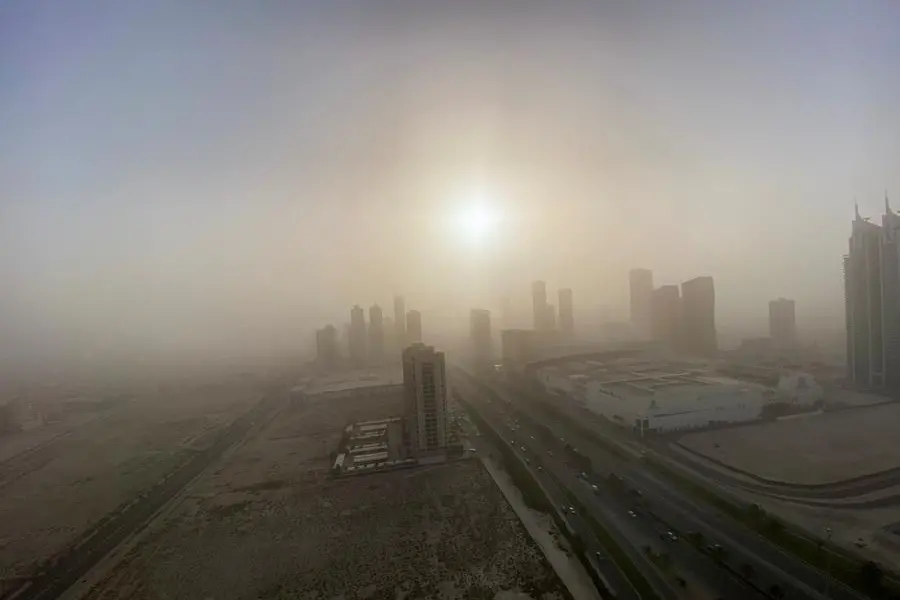PHOTO
Bahrain - Asthma patients and people susceptible to dust allergies have been advised to stay indoors as unsettled weather in Bahrain is expected to continue.
A heavy dust storm blanketed parts of the kingdom yesterday with winds of 25-30 knots, and weathermen forecast the dust haze to persist today.
Meanwhile, hospitals across the nation reported an increase in the number of patients suffering from dust allergies and respiratory illnesses.
Sources at the country’s main hospital, the Salmaniya Medical Complex, confirmed a 10 per cent surge in patients over the past two days, while private hospitals too reported an increase in cases since the weekend.
“In the last two days, the SMC Accident and Emergency department saw an increase in patients showing allergic reactions, or complaining of respiratory problems – at least by 10pc,” the SMC sources told the GDN yesterday.
“There has also been a rush of patients with asthma, cough and cold – with a significant number of them being children and the elderly.”
Royal Bahrain Hospital Internal Medicine and Immunology consultant Dr Daisy Samaha also noted an increase in cases due to increased air pollution and allergen burden.
“Dust and all air allergens and particles are a risk for the development of lung disease, particularly in patients with allergies and asthma,” she explained.
“In normal patients, this increase in air particles raises the risk of developing asthma.
“So preferably, people should avoid going out in this weather, and if they do, cover their mouth and nose with a wet cloth to prevent dust particles from entering the airways.
“Masks alone do not protect against dust particles.”
The Health Ministry also advised the public to take preventive measures to protect their health.
Shifa Al Jazeera Medical Centre Internal Medicine specialist Dr Pradeep Kumar said the out-patient department had seen an increase in cases of fever, cough, and upper respiratory infections since mid-April.
“The onset of summer and windy weather is increasing the incidence of allergy and respiratory illness,” he said.
“From mid-April to the present, the country has experienced an unstable climate with three or more dust storms, which is a high risk factor for allergic cases, asthma, viral fever, and respiratory illnesses.”
He also pointed out that it was difficult to distinguish between normal respiratory illness and Covid-19, which he said required a swab test, and urged people to be cautious and keep living spaces clean.
“Houses should be as dust-free as possible and require frequent wet mopping; curtains and bed sheets must be washed frequently, and bed linen and carpets must be vacuum-cleaned.
“Clean your indoor air-conditioning filter unit every two weeks, or more frequently if it is dusty.”
He also advised allergic patients to avoid pets and to wear a face mask both inside and outside.
Pharmacies also reported an increase in face mask sales.
“People were anyway buying face masks, though Covid-19 restrictions were eased, but with the dusty weather, more people are buying masks,” said a pharmacist in Juffair.
“Interestingly, there is a demand for children’s masks, and people are specifically asking for masks that will help them protect themselves from dust,” he added.
Nebulisers which are used in an emergency to deliver high doses of asthma relief medication were also in high demand, according to another pharmacist in Hoora.
“Normally, people buy dust or loop masks during dusty weather, but demand was higher this time, as also for asthma medications and nebulisers.”
Meanwhile, municipality workers were continuously removing dust and sand accumulated on the main roads, highways, pavements and streets. They also cleared debris that was thrown onto the street as well as trees that were uprooted in the strong winds.
© Copyright 2020 www.gdnonline.com
Copyright 2022 Al Hilal Publishing and Marketing Group Provided by SyndiGate Media Inc. (Syndigate.info).




















